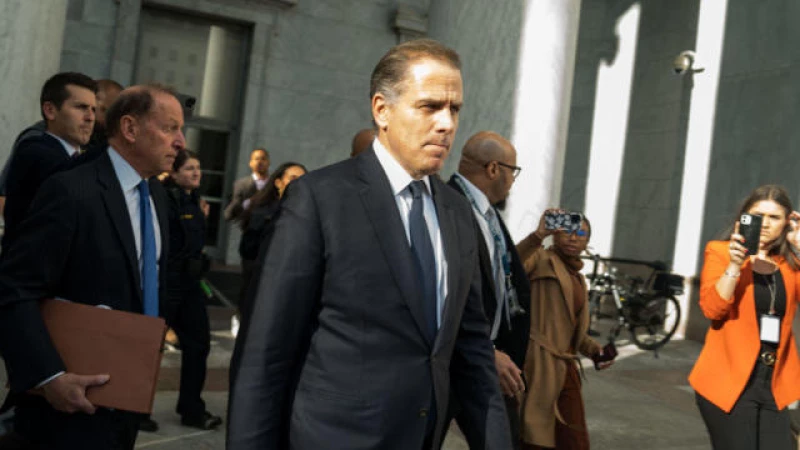Special Counsel Responds to Hunter Biden's Motions to Dismiss Firearm Charges
In a series of legal filings, the special counsel's office led by David Weiss has issued a response to Hunter Biden's attempts to dismiss the federal firearms charges filed against him in Delaware. Hunter Biden's attorneys claimed that the charges were "unprecedented" and "unconstitutional," alleging a violation of a diversion agreement signed in 2023.
However, the federal prosecutors, in their court documents, have refuted these claims. They argued that the gun charges faced by the president's son were not a result of a politically motivated or selective prosecution, as suggested by the defense. Instead, they presented evidence from Hunter Biden's own words in his 2021 memoir, "Beautiful Things," as well as recovered text messages and the presence of cocaine residue on a leather firearm pouch. These pieces of evidence indicated that Hunter Biden had unlawfully possessed a firearm during a period when he struggled with drug addiction.
"The charges in this case are not fabricated or influenced by former President Trump. They are a consequence of the defendant's own decisions and have been brought forth despite any external pressures from politicians," stated the prosecutors in their filings.
Hunter Biden Indicted on Firearm Charges
In a surprising turn of events, Hunter Biden, son of President Joe Biden, has been indicted by a federal grand jury on three felony charges. The charges stem from his alleged unlawful purchase and possession of a Colt Cobra .38 Special revolver in October 2018, during a period when he was a drug user.
Biden pleaded not guilty to all three charges in 2023, and his legal counsel maintains that a diversion agreement, which would have protected him from federal gun charges if he agreed not to use drugs or possess a firearm, is still valid and legally binding.
However, federal prosecutors argue that the diversion agreement was never approved by U.S. Probation and therefore never went into effect. This raises questions about the validity of the agreement and whether it would have allowed Biden to avoid potential future charges.
In addition to the firearm charges, Biden also faces tax charges related to a plea deal. This plea deal came under scrutiny in federal court in July, when a judge questioned its terms and potential implications for future charges.
Biden's attorneys are relying on a Second Amendment argument, which has been favored by his father's political opponents. They point to the Supreme Court's 2022 decision in New York State Rifle & Pistol Association v. Bruen, which established a new legal test for evaluating state and federal gun laws. This test requires judges to consider whether these laws are "consistent with the nation's historical tradition of firearm regulation," according to Justice Clarence Thomas.
In their motion to dismiss, Biden's counsel argued that the statute federal prosecutors used to charge him with the unlawful possession of a firearm as a drug user was unconstitutional because they cannot prove that he was using drugs at the moment of the transaction to purchase the firearm.
In response, prosecutors for the special counsel stated that the government has evidence that Hunter Biden engaged in drug use while he possessed the firearm, and "Anglo American law has long recognized the government's ability to restrict access to firearms" for those whose possession would pose a risk to public safety.
Federal prosecutors also argued that the special counsel's appointment in itself and funding for the investigation was lawful after Hunter Biden's attorneys asserted that it had not been approved by Congress and therefore violated the Appropriations Clause.
The Justice Department has the authority to "designate any officer of the Department to represent the United States in court," prosecutors responded, and its designated congressional appropriation covers the independent investigation.
The ongoing investigation into Hunter Biden, led by Weiss, had spanned five years over the course of both the Trump and Biden administrations. Weiss was appointed U.S. attorney for Delaware by former President Donald Trump and named special counsel by Attorney General Merrick Garland in 2023.
Hunter Biden Charged with Federal Tax Evasion
Hunter Biden, son of President Joe Biden, has been indicted on federal charges in California for his alleged involvement in a tax evasion scheme. The charges were brought by special counsel Weiss' office and include failure to file and pay taxes, evasion of assessment, and filing a false or fraudulent tax return.
Prosecutors claim that Hunter Biden engaged in a four-year scheme to avoid paying at least $1.4 million in federal taxes. He has pleaded not guilty to nine federal tax charges and could face up to 17 years in prison if convicted.







